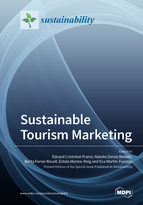Sustainable Tourism Marketing
A special issue of Sustainability (ISSN 2071-1050). This special issue belongs to the section "Tourism, Culture, and Heritage".
Deadline for manuscript submissions: closed (31 October 2019) | Viewed by 105141
Special Issue Editors
Interests: digital marketing; destination management and marketing; sustainable tourism; tourism and ict; social marketing; sharing economy
Interests: e- tourism, e-marketing, gastronomy, social media marketing, snow tourism, sustainable tourism marketing
Interests: e-marketing, e-tourism, peer-to-peer accommodation, social media marketing, sustainable tourism marketing, compositional data analysis
Interests: tourism; destination image; social media; online user-generated content; smart tourism
Special Issues, Collections and Topics in MDPI journals
Interests: e-tourism; e-marketing; social media; hospitality; sharing economy; peer-to-peer experiences platforms; peer-to-peer accommodation platforms
Special Issues, Collections and Topics in MDPI journals
Special Issue Information
Dear Colleagues,
Research on tourism marketing tends to place a greater focus on consumer behaviour and its impact on destinations, as well as on the use of tourism services or products, than on sustainability. However, this field has a long tradition of research into aspects related to promoting tourism products and services that respect the environment and local communities from the perspective of both supply and demand.
Sustainable tourism is a concept that demands more concreteness and action. It takes into account the economic, social, and environmental impact of satisfying the current needs of visitors, the industry, the environment, and host communities without compromising the ability to meet the needs of future generations.
Consciousness-raising on the part of society, in general, and the tourist, in particular, about respectful consumption in regard to the environment is affecting the tourist industry. This situation is triggering changes in tourism activity programs that, in turn, imply changes in the ways in which both companies and tourist destinations are managed. Moreover, it has generated a marketing management committed to themes of sustainability and consumer behaviour, the marketing of sustainable products, product design and green brands, labelling, and advertising.
The objective of this Special Issue is to analyze the main contributions made as a result of research related to sustainable tourism-marketing management and current trends in this field. Therefore, the Issue aims to gather articles about the marketing of destinations and the marketing management of companies and tourism organizations (i.e., destination-management organizations, hotel companies, catering companies, transport companies, travel agencies, etc.) from a sustainable tourism perspective. To achieve this goal, this Special Issue calls for studies that analyze the marketing strategies adopted by tourism companies and institutions or tourist destinations in order to manage visitors in a sustainable manner, to promote destinations in marginal areas, and to promote territorial balance, or to analyze the effect of tourism on the consumption of local products and the economic development of host communities.
Special attention will be given to contributions that provide good practices for managing territories and/or companies that adopt sustainable marketing strategies without neglecting the integration and use of information and communication technologies in sustainable tourism-marketing strategies.
We will welcome research articles; case studies; and theoretical, methodological, and applied papers that analyze sustainable tourism marketing at the destination level as well as at the company level and tourist behavior from an interdisciplinary point of view.
We consider that this Special Issue can contribute to better management and dissemination of sustainable tourism, thus helping destinations and the tourism industry to commercialize products or services that respect the environment.
Prof. Dr. Eduard Cristobal-Fransi
Prof. Dr. Natalia Daries Ramón
Dr. Berta Ferrer-Rosell
Dr. Estela Marine-Roig
Prof. Dr. Eva Martin-Fuentes
Guest Editors
Manuscript Submission Information
Manuscripts should be submitted online at www.mdpi.com by registering and logging in to this website. Once you are registered, click here to go to the submission form. Manuscripts can be submitted until the deadline. All submissions that pass pre-check are peer-reviewed. Accepted papers will be published continuously in the journal (as soon as accepted) and will be listed together on the special issue website. Research articles, review articles as well as short communications are invited. For planned papers, a title and short abstract (about 100 words) can be sent to the Editorial Office for announcement on this website.
Submitted manuscripts should not have been published previously, nor be under consideration for publication elsewhere (except conference proceedings papers). All manuscripts are thoroughly refereed through a single-blind peer-review process. A guide for authors and other relevant information for submission of manuscripts is available on the Instructions for Authors page. Sustainability is an international peer-reviewed open access semimonthly journal published by MDPI.
Please visit the Instructions for Authors page before submitting a manuscript. The Article Processing Charge (APC) for publication in this open access journal is 2400 CHF (Swiss Francs). Submitted papers should be well formatted and use good English. Authors may use MDPI's English editing service prior to publication or during author revisions.
Keywords
- Sustainability and marketing strategies of the tourism industry
- Sustainable tourist behavior and social practices
- Touristic marketing interventions for sustainability
- Sustainable destination marketing and management
- Sustainable tourism and sustainable-tourism products
- Critical perspectives on touristic marketing and sustainability
- Digital marketing strategies for sustainable tourism
- Upstream social touristic marketing and sustainability
- Current trends in marketing and tourism









